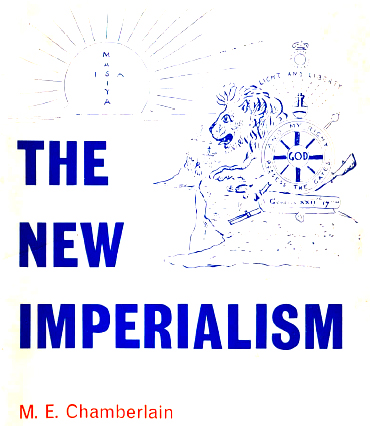The New Imperialism
Classic Pamphlet

Interpretations of Imperialism
This Classic Pamphlet first published in 1970 comes with a new introduction written by the author M. E. Chamberlain.
The New Imperialism - Introduction by M. E. Chamberlain Professor Emeritus at Swansea University. May 2010.
When this pamphlet was first published imperialism was a hot political topic and battle raged between Marxist and anti-Marxist, or at least non-Marxist, historians. Marxist historians naturally attributed the whole phenomenon to economic causes, with a particular emphasis on finance capital. The major non-Marxist historians such as Professors Robinson and Gallagher, Professor David Fieldhouse and Professor D.C.M. Platt, while not denying the existence of economic causes, were extremely sceptical about the role of finance capital. Fieldhouse pointed out ‘The places now to be taken over had hitherto attracted little capital, and did not attract it in any quantity subsequently'. Robinson and Gallagher argued that the commercial opening up of Africa came after the partition was competed. Platt reminded his readers that the British government had always been extremely reluctant to come to the aid of citizens who had rashly invested in unstable regions and so could hardly be regarded as the financiers' cat's paw. While not rejecting all economic explanations, non-Marxist historians tended to emphasize other factors, political, strategic and psychological. Robinson and Gallagher argued that Britain only became involved in Africa to defend the route to India and so was more interested in East Africa, than in West Africa where, they contended, commercial opportunities were better. Fieldhouse linked this phase of imperialism with the dangerously balanced political situation in Europe. Strident nationalism and arms races were held to have played their part. With the fall of communism, the battle lines disintegrated and it became possible for historians, like Professors Cain and Hopkins, to re-examine the role of finance, in the form of the City of London, in the history of the British empire. (See P.Cain and A.G. Hopkins, British Imperialism, Vol 1, Innovation and Expansion, 1688-1913,Longman, 1993)
Both Marxist and non-Marxist historians had tended to assume that all important decisions were taken in European capitals and see Africans and Asians as the passive victims (or in the eyes of some beneficiaries) of decisions taken elsewhere. Fieldhouse did suggest in some of his later writings that more attention should be paid to the ‘periphery', that is non-European factors, and Robinson began to explore the idea that African societies were divided in their response to European pressures and that European conquest would have been difficult, if not impossible, if they had not found African ‘collaborators'. Robinson and Gallagher even suggested that European actions were often simply reactions to the ‘proto-nationalism of Islam'. In the light of later developments, it is an interesting idea but they never worked it out in any detail and it is not quite clear what they were thinking of. The Mahdi in the Sudan would seem to be an early example of Islamic fundamentalism. But there was another entirely different aspect to late nineteenth century Islam, associated with the name of Jamal al-Din al-Afghani (1838-1897). While critical of the materialism of the West, Afghani wanted to see a modernisation and reform of Islam to bring it into conformity with modern science and philosophy. French thought was well-known in Egypt and the first generation of Egyptian nationalists, who were surprisingly familiar with the precedents of the French Revolution, wished to shake off Ottoman rule and expected support, not opposition, from the West. This was well-known to orientalists like Wilfrid Scawen Blunt, who sympathised with both Egyptian and Indian nationalism.
In Britain support for an imperialist policy was never a conservative monopoly. Not only most of the Liberal party but also the working classes in general and the nascent Labour party for the most part supported it. This was slightly puzzling to a post-second World War generation, who had come to see imperial expansion as reprehensible. Only very recently have powerful voices begun to ask for a reassessment. Niall Ferguson (probably the best known) wrote ‘It is nowadays quite conventional to think that, on balance, it {Empire} was bad.' (Empire, Penguin, 2004, p. Xi) He goes on to suggest that there were some beneficial results, even for the conquered, but, more fundamentally, the modern world of globalisation, which we all know, could not have been created without it.
Changes of nomenclature. A number of colonial territories chose to change their names on attaining independence in the decades after the Second World War and so may not be immediately recognisable to the modern reader under their old names. French Indo-China comprises the independent states of Vietnam, Cambodia and Laos. Name changes were particularly common in Africa. The following were among the most important. The Gold Coast is now Ghana; Northern Rhodesia, Zambia. Southern Rhodesia was briefly simply Rhodesia but is now Zimbabwe. Nyasaland is now Malawi; Bechuanaland, Botswana; and Basutoland, Lesotho. Tanganyika has joined with Zanzibar to form Tanzania.
This resource is FREE for Student HA Members.
Non HA Members can get instant access for £3.49

